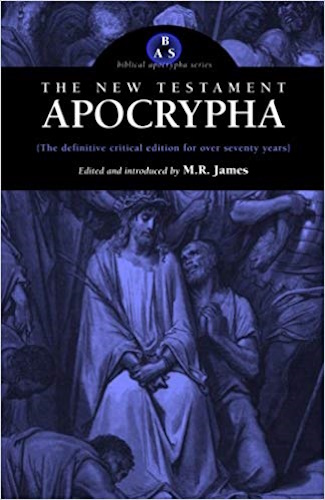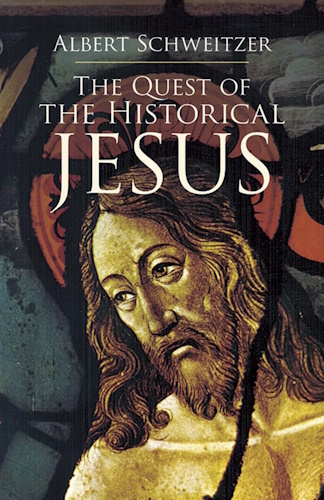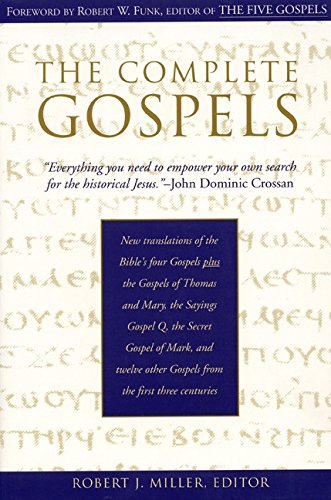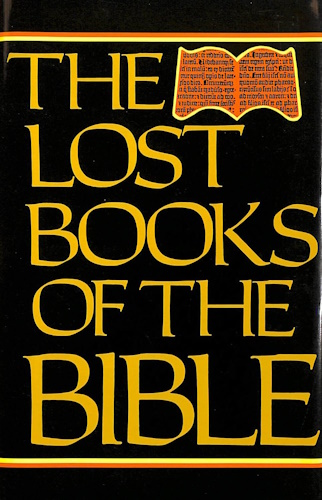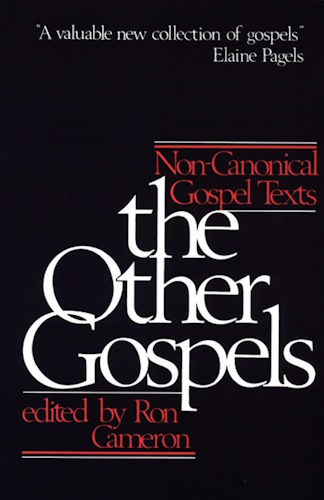
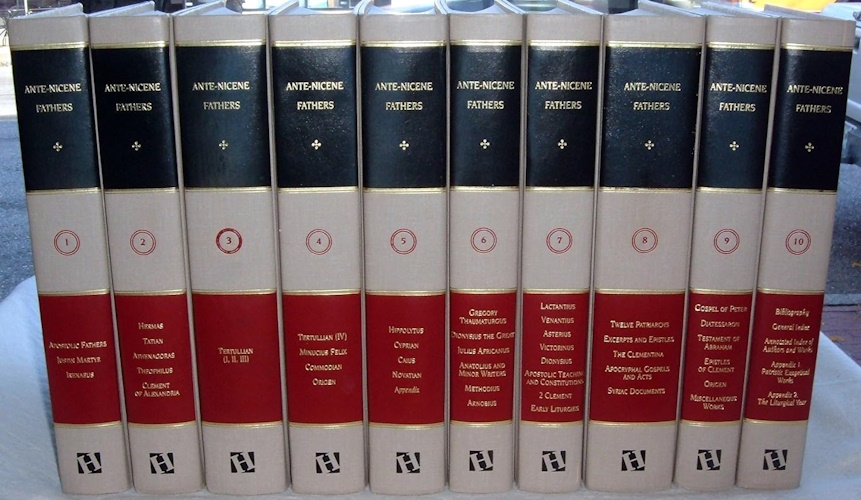
The Pastor of Hermas
Book Second-Commandments
Commandment Sixth
From: Early Church Fathers 38 Volumes
Ante-Nicene Fathers: The Writings of the Fathers down to a.d. 325 Vol. II
edited by
Rev. Alexander Roberts, D.D., and James Donaldson, LL.D.
Translated by the Rev. F. Crombie, M.A.
The Pastor of Hermas
COMMANDMENT SIXTH.
How to Recognise the Two Spirits Attendant on Each Man, and How to Distinguish the Suggestions of the One from Those of the Other.
CHAP. I.
"I gave you," he said, "directions in the first commandment to attend to faith, and fear, and self-restraint." "Even so, sir," said I. And he said, "Now I wish to show you the powers of these, that you may know what power each possesses. For their powers are double, and have relation alike to the righteous and the unrighteous. Trust you, therefore, the righteous, but put no trust in the unrighteous. For the path of righteousness is straight, but that of unrighteousness is crooked. But walk in the straight and even way, and mind not the crooked. For the crooked path has no roads, but has many pathless places and stumbling-blocks in it, and it is rough and thorny. It is injurious to those who walk therein. But they who walk in the straight road walk evenly without stumbling, because it is neither rough nor thorny. You see, then, that it is better to walk in this road." "I wish to go by this road," said I. "You will go by it," said he; "and whoever turns to the Lord with all his heart will walk in it."
CHAP. II.
"Hear now," said he, "in regard to faith. There are two angels191 with a man—one of righteousness, and the other of iniquity." And I said to him, "How, sir, am I to know the powers of these, for both angels dwell with me?" "Hear," said he, and "understand them. The angel of righteousness is gentle and modest, meek and peaceful. When, therefore, he ascends into your heart, forthwith192 he talks to you of righteousness, purity, chastity, contentment, and of every righteous deed and glorious virtue. When all these ascend into your heart, know that the angel of righteousness is with you. These are the deeds of the angel of righteousness. Trust him, then, and his works. Look now at the works of the angel of iniquity. First, he is wrathful, and bitter, and foolish, and his works are evil, and ruin the servants of God. When, then, he ascends into your heart, know him by his works." And I said to him, "How, sir, I shall perceive him, I do not know." "Hear and understand" said he. "When anger comes upon you, or harshness, know that he is in you; and you will know this to be the case also, when you are attacked by a longing after many transactions,193 and the richest delicacies, and drunken revels, and divers luxuries, and things improper, and by a hankering after women, and by overreaching, and pride, and blustering, and by whatever is like to these. When these ascend into your heart, know that the angel of iniquity is in you. Now that you know his works, depart from him, and in no respect trust him, because his deeds are evil, and unprofitable to the servants of God. These, then, are the actions of both angels. Understand them, and trust the angel of righteousness; but depart from the angel of iniquity, because his instruction is bad in every deed.194 For though a man be most faithful,195 and the thought of this angel ascend into his heart, that man or woman must sin. On the other hand, be a man or woman ever so bad, yet, if the works of the angel of righteousness ascend into his or her heart, he or she must do something good. You see, therefore, that it is good to follow the angel of righteousness, but to bid farewell196 to the angel of iniquity."
"This commandment exhibits the deeds of faith, that you may trust the works of the angel of righteousness, and doing them you may live to God. But believe the works of the angel of iniquity are hard. If you refuse to do them, you will live to God."
191 [See Tob. iii. 8, 17. The impure spirit, and the healing angel. This apocryphal book greatly influenced the Church's ideas of angels, and may have suggested this early reference to one's good and evil angel. The mediæval ideas on this subject are powerfully illustrated in the German legends preserved by Sir. W. Scott in The Wild Huntsman and The Fire-King.]
192 Forthwith … heart, omitted in Lips.
193 Transactions. I think the writer means, when a longing is felt to engage with too great devotedness to business and the pursuit of wealth. ["That ye may attend upon the Lord without distraction." 1 Cor. vii. 35.]
194 Trust … deed. Trust the angel of righteousness, beacause his instruction is good.—Vat.
195 Faithful. Most happy.—Vat.
196 But to bid farewell. The Vat. ends quite differently from this point: If, then, you follow him, and trust to his works, you will live to God; and they who trust to his works will live to God.—Vat.
The Pastor of Hermas - Book Second.—Commandments.
Commandment Sixth..
How to Recognise the Two Spirits Attendant on Each Man, and How to Distinguish the Suggestions of the One from Those of the Other.
![]()
![]()
-
Urantia Book, 44:0.11 - The Celestial Artisans
Never in your long ascendancy will you lose the power to recognize your associates of former existences. Always, as you ascend inward in the scale of life, will you retain the ability to recognize and fraternize with the fellow beings of your previous and lower levels of experience. Each new translation or resurrection will add one more group of spirit beings to your vision range without in the least depriving you of the ability to recognize your friends and fellows of former estates.
-
Princess Bride 1987 Wallace Shawn (Vizzini) and Mandy Patinkin (Inigo Montoya)
Vizzini: HE DIDN'T FALL? INCONCEIVABLE.
Inigo Montoya: You keep using that word. I do not think it means what you think it means. -
Urantia Book, 117:4.14 - The Finite God
And here is mystery: The more closely man approaches God through love, the greater the reality -- actuality -- of that man. The more man withdraws from God, the more nearly he approaches nonreality -- cessation of existence. When man consecrates his will to the doing of the Father's will, when man gives God all that he has, then does God make that man more than he is.
-
Urantia Book, 167:7.4 - The Talk About Angels
"And do you not remember that I said to you once before that, if you had your spiritual eyes anointed, you would then see the heavens opened and behold the angels of God ascending and descending? It is by the ministry of the angels that one world may be kept in touch with other worlds, for have I not repeatedly told you that I have other sheep not of this fold?"
-
Urantia Book, Foreword - 0:12.12 - The Trinities
But we know that there dwells within the human mind a fragment of God, and that there sojourns with the human soul the Spirit of Truth; and we further know that these spirit forces conspire to enable material man to grasp the reality of spiritual values and to comprehend the philosophy of universe meanings. But even more certainly we know that these spirits of the Divine Presence are able to assist man in the spiritual appropriation of all truth contributory to the enhancement of the ever-progressing reality of personal religious experience—God-consciousness.
-
Urantia Book, 1:4.3 - The Mystery Of God
When you are through down here, when your course has been run in temporary form on earth, when your trial trip in the flesh is finished, when the dust that composes the mortal tabernacle "returns to the earth whence it came"; then, it is revealed, the indwelling "Spirit shall return to God who gave it." There sojourns within each moral being of this planet a fragment of God, a part and parcel of divinity. It is not yet yours by right of possession, but it is designedly intended to be one with you if you survive the mortal existence.
-
Urantia Book, 1:4.1 - The Mystery Of God
And the greatest of all the unfathomable mysteries of God is the phenomenon of the divine indwelling of mortal minds. The manner in which the Universal Father sojourns with the creatures of time is the most profound of all universe mysteries; the divine presence in the mind of man is the mystery of mysteries.
-
Urantia Book, 1:4.6 - The Mystery Of God
To every spirit being and to every mortal creature in every sphere and on every world of the universe of universes, the Universal Father reveals all of his gracious and divine self that can be discerned or comprehended by such spirit beings and by such mortal creatures. God is no respecter of persons, either spiritual or material. The divine presence which any child of the universe enjoys at any given moment is limited only by the capacity of such a creature to receive and to discern the spirit actualities of the supermaterial world.
-
Urantia Book, 11:0.1 - The Eternal Isle Of Paradise
Paradise is the eternal center of the universe of universes and the abiding place of the Universal Father, the Eternal Son, the Infinite Spirit, and their divine co-ordinates and associates. This central Isle is the most gigantic organized body of cosmic reality in all the master universe. Paradise is a material sphere as well as a spiritual abode. All of the intelligent creation of the Universal Father is domiciled on material abodes; hence must the absolute controlling center also be material, literal. And again it should be reiterated that spirit things and spiritual beings are real.
-
Urantia Book, 50:6.4 - Planetary Culture
Culture presupposes quality of mind; culture cannot be enhanced unless mind is elevated. Superior intellect will seek a noble culture and find some way to attain such a goal. Inferior minds will spurn the highest culture even when presented to them ready-made.
-
Urantia Book, 54:1.6 - True And False Liberty
True liberty is the associate of genuine self-respect; false liberty is the consort of self-admiration. True liberty is the fruit of self-control; false liberty, the assumption of self-assertion. Self-control leads to altruistic service; self-admiration tends towards the exploitation of others for the selfish aggrandizement of such a mistaken individual as is willing to sacrifice righteous attainment for the sake of possessing unjust power over his fellow beings.
-
Urantia Book, 54:1.9 - True And False Liberty
How dare the self-willed creature encroach upon the rights of his fellows in the name of personal liberty when the Supreme Rulers of the universe stand back in merciful respect for these prerogatives of will and potentials of personality! No being, in the exercise of his supposed personal liberty, has a right to deprive any other being of those privileges of existence conferred by the Creators and duly respected by all their loyal associates, subordinates, and subjects.
-
Urantia Book, 54:1.8 - True And False Liberty
There is no error greater than that species of self-deception which leads intelligent beings to crave the exercise of power over other beings for the purpose of depriving these persons of their natural liberties. The golden rule of human fairness cries out against all such fraud, unfairness, selfishness, and unrighteousness.
